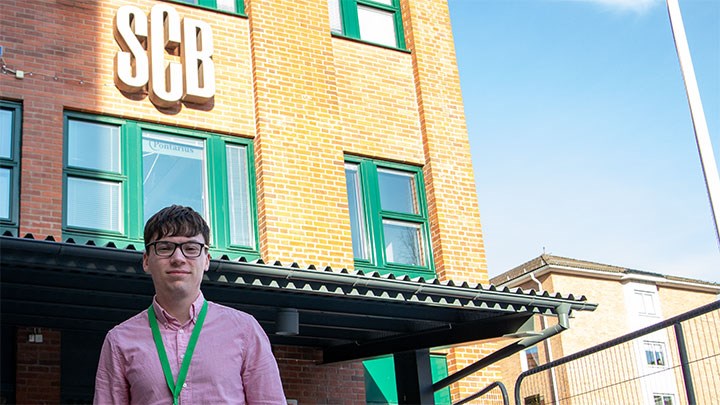“A master’s degree in statistics makes you more attractive in the job market.”

“Statisticians are in high demand in all industries,” says Jacob Kasche, a Methodologist at Statistics Sweden.
A master’s degree in statistics opens the door for more advanced tasks at attractive employers. Jacob Kasche is a Methodologist at Statistics Sweden (SCB), where he investigates how big data and AI can be applied to generate improved labour market statistics in the future.
“All the loose ends were tied up in the master’s programme, allowing me to understand the bigger picture.”
There has never been as much data in the world as right now. Since 2010, the amount of data worldwide increased by 5,000 per cent, according to RISE (Research Institutes of Sweden AB). In 2022 alone, humankind produced more data than in the 30-year history of the Internet.
This means that the demand for persons who understand and can interpret large amounts of data is greater than ever.
“SCB’s mission is to provide society with statistics that society can trust. Given the amount of information available today, verifying what is a good source is becoming increasingly important. Otherwise, it can get tricky – and increasingly difficult for decision-makers and authorities to make informed decisions going forward,” says Jacob Kasche.
Developing methods for statistics in the future
Jacob Kasche works at Statistics Sweden’s head office in Örebro in a team responsible for developing new methods to ensure future labour market statistics are even more accurate.
“For example, we’re looking at new data sources, such as job portals and mobile networks. We’re collecting data that wasn’t necessarily intended for statistical purposes but can still be used to make our statistics more efficient,” he says.
Jacob Kasche is also in a team exploring how Statistics Sweden can apply AI and machine learning as methods – an area of development progressing rapidly, which he feels is both meaningful and challenging.
“Here at Statistics Sweden, you do many different things and can grow within the organisation. For me, it’s exciting to be in the method section, where we devote ourselves to things slightly more theoretical. There is so much data that it’s like a giant arcade full of unusual types of data that you can tinker around with. Right now, I’m at one end of Statistics Sweden, so there’s much more to explore ahead of me.”
Örebro’s master programme provided a greater understanding
Jacob Kasche is entirely satisfied with his decision to build on his undergraduate studies with a master’s degree. Which is a prerequisite for the area he is working in today.
“All the loose ends were tied up in the master’s programme, and I got a greater understanding of the bigger picture. So that’s when I learned the most. Getting insight into what’s behind the formulas you see in the statistics. I’ve always wanted to understand everything I do, not just do it.”
Via SCB, Jacob Kasche got the opportunity to participate in the Hackathon in Brussels, a five-day competition where statistical agencies from all over Europe compete in programming.
“It was enjoyable and quite challenging. And intense days, and we stayed quite a bit longer than normal office hours. That’s one of the things that I like about Statistics Sweden. So many like-minded people here are enthusiastic and really interested in what we work with.”
Do you have any tips for those considering getting a master’s in statistics?
“Just do it! It’ll be worth it. You’ll gain greater knowledge and a better understanding, making you more attractive in the job market. Even those who’ve worked for a few years will benefit greatly from picking up the latest knowledge about handling large amounts of data and machine learning.”
Text and photo: Anna Lorentzon
Translation: Jerry Gray
